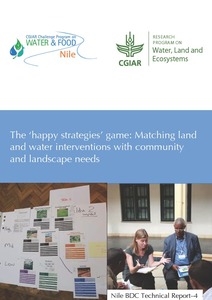The changing face of irrigation in Kenya: opportunities for anticipating changes in Eastern and Southern Africa
Testing criteria and indicators for the sustainable management of forests: phase 1. Final Report
This report documents the conduct of the first field tests of criteria and indicators (C&I) at the forest management unit level. Interdisciplinary and international teams of five persons conducted tests of five sets of C&I in four countries (Germany, Indonesia, Brazil, and Cote d’Ivoire). This report provides a description of the methods used, a thorough analysis of the findings, a combined generic template of C&I dealing with production forestry, policy, social and ecological issues, based on the groups’ results.
The Chinyanja triangle in the Zambezi River Basin, southern Africa: status of, and prospects for, agriculture, natural resources management and rural development
The Chinyanja Triangle (CT) is an area inside the Zambezi
River Basin, inhabited by Chinyanja-speaking people
sharing a similar history, language and culture across
the dryland systems of the eastern province of Zambia,
southern and central regions of Malawi and Tete Province
of Mozambique. Chiefs and Chiefdoms play a critical role
in decision making and influencing social relationships. The
Zambezi River, which originates in the Kalene Hills in Zambia
is joined by ten big tributaries from six countries, and is
Textes et textes de loi sur la gestion des ressources naturelles au Burkina Faso
La gestion durable des ressources naturelles, notamment dans les pays du Sahel, a toujours soulevé des problèmes dont celui de l’inadaptation des législations nationales y relatives. Le processus d’élaboration et de mise en œuvre de ces législations est à l’image des conditions politiques, socio-économiques et culturelles des pays en question. Le Burkina Faso, pour sa part, a connu plusieurs formes de régimes politiques et, de ce fait, capitalise un certain nombre d’expériences de réformes législatives et réglementaires dans le secteur des forêts et des ressources naturelles.
The Chinyanja triangle in the Zambezi River Basin, southern Africa: status of, and prospects for, agriculture, natural resources management and rural development
The ‘happy strategies’ game: Matching land and water interventions with community and landscape needs
The evolution of swidden fallow secondary forests in Asia
Swidden agriculture in tropical Asia is a diverse practice, making it difficult to draw general conclusions on trends of the development of swidden fallow secondary forests (SFSF). There is, however, sufficient evidence to recognise trends of a gradual intensification often through the incorporation of extensive tree crop production in SFSF, or a direct conversion to intensive tree cash cropping. Factors contributing to the changes include emerging markets for cash crops or timber and pulp wood production, government policies and development projects, fire, and population pressures.
The Evolving Farming and Pastoral Landscapes in Ethiopia: A Farming System Framework for Investment Planning and Priority Setting
The domestic market for small-scale chainsaw milling in Cameroon: present situation, opportunities and challenges
In 1994 Cameroon adopted a new forest law that focussed on the large-scale, export-oriented industrial forest sector while timber produced through small-scale logging for the domestic market was ignored, even in official statistics, and is generally produced without a valid permit. As Cameroon prepares to implement the Voluntary Partnership Agreement (VPA) it recently signed with the European Union, promising a legal framework for all national timber production, this occasional paper presents a quantitative and qualitative evaluation of the country’s domestic timber market.


